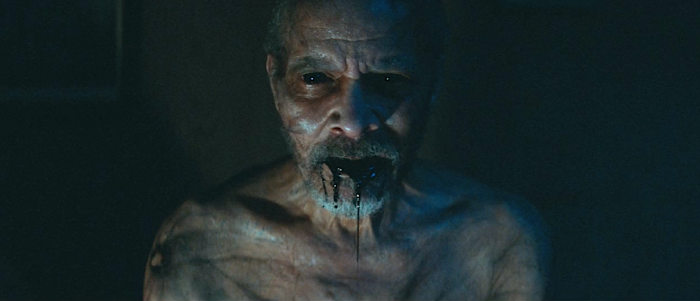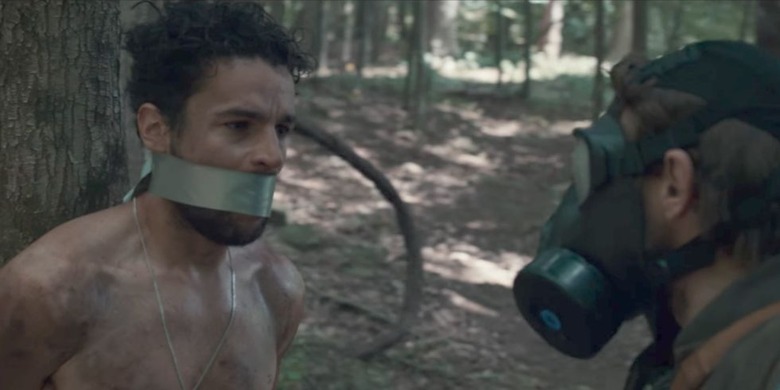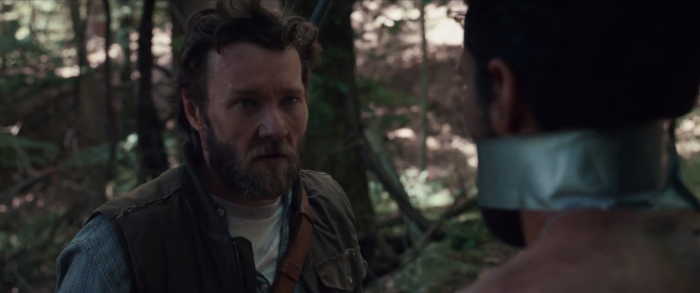'It Comes At Night' Is An Excellent Movie, But It's Not The Movie You're Being Sold
(Welcome to The Soapbox, the space where we get loud, feisty, and opinionated about something that makes us very happy...or fills us with indescribable rage. In this edition: the excellent marketing for It Comes at Night is doing the movie a disservice.)
The trailers for It Comes at Night have been magnificent and the folks at A24 (or whoever they employed to edit them) should be commended. Each preview has evoked a menace and a terror rarely found in horror movie marketing. I have watched as that trailer made entire audiences grow tense. I have felt my wife, a huge horror fan, nudge me in the side, her non-verbal way of saying "take me to see that, please."
Removed from the trailers, It Comes at Night is an excellent movie and writer/director Trey Edward Shults, his cast, and his crew should also be commended. In a summer filled with bombastic blockbusters, it's a disturbing, patient, and upsetting experience that crawls under your skin and festers. It's the kind of movie that will find an audience – people who will want to talk about it for some time to come.
But here's the thing: It Comes at Night, while certainly worth your time and money, is not the movie A24 is selling. At all. In any way. And that's not going to sit well with some audiences.
The Misleading Trailer Thing
Expectations are a dangerous thing. As much as moviegoers may claim they want to be surprised by a movie, they don't like feeling they've been the victim of a bait-and-switch, that they've been manipulated into seeing a different movie than they were promised. Even if the final film is good (or even great), there's a kneejerk response that has only gotten louder in the age of social media. People don't like to be told they're seeing a terrifying roller coaster of a cabin-in-the-woods movie and then find themselves watching an arthouse horror film about the disintegration of trust and family units in the face of a crumbling civilization.
You've seen this kind of scenario before. The trailer for Crimson Peak promised a spooky haunted house movie, not the beautifully melodramatic "gothic romance" that Guillermo del Toro actually made. The trailer for Drive promised an action movie filled with car chases and shootouts, not the moody tone piece Nicolas Winding Refn delivered (this one inspired a ridiculous lawsuit!). A24 actually encountered this themselves when they released The Witch in theaters last year – audiences hoping for a more traditional horror movie were puzzled, and sometimes enraged, by the more oblique and psychological film that was actually projected on the screen.
The list goes on, but let's stop there because these movies all have one thing in common: they are genuinely excellent movies from true artists that were sold as something more accessible and traditionally entertaining. Now we can add It Comes at Night to the list.
If a Film Screens in the Forest...
I saw It Comes At Night under strange circumstances: a promotional screening in the middle of the woods, with the audience sitting in a clearing in front of the screen. It took a 45-minute bus trip and a short hike across uneven, muddy terrain to get to the seats. It was the kind of over-the-top, insane gimmick I love. This is a film about people surviving in the woods during the post-apocalypse, so yeah, it really does play well when you view it far removed from civilization.
But even during this event, expectations were shifting in the wrong direction. The chatter on the buses involved how frightening the movie would be and if the location meant that actors would be hired to jump out at us as we walked through the dark woods. Considering that I once attended a Dawn of the Dead screening that featured literally dozens of actors in zombie make-up menacing the crowd in the shopping mall where it was being held, this seemed plausible.
In retrospect, it would have been inappropriate for actors to jump out and yell "Boo!" on our way to this screening. There are no jump scares in It Comes at Night and there are no monsters or easy tricks. There is only an eerie and unsettling sense of wrongness. But the effective marketing had set up this crowd for a different experience. The woods, rather than feeling like an isolated place where the normal laws of humanity have ceased to matter (an appropriate reflection of the film!), felt, to many in the audience, like a haunted house waiting to happen.
The Q&A with Trey Edward Shults that followed the film was, for the lack of a more appropriate phrase, a clusterfuck – baffled, annoyed audience members asked him to explain the movie's intentional mysteries, to explain what the "it" in the title was (because nothing in the movie literally comes at night, you see). Speaking to other film writers and civilians after the screening, there was a sense of bitter disappointment amongst many of them – "Yeah, that was good...but it wasn't what I was expecting." Many people, film fans adventurous enough to go watch a movie in the middle of the woods at night, went home bummed out.
Readjusting Expectations
This is the part of the article where I reiterate that I loved It Comes at Night and think that you should give it a chance this weekend. I also think the film's marketing has set it up for profoundly negative word of mouth come Monday, as audiences start to tell their friends to avoid it all costs because it's "not like the trailers." I fear that the conversation surrounding this smart, creepy, and beautifully made movie will become entirely about it pissing people off and not about how Shults uses space and music to create nightmarish visuals or Joel Edgerton's quietly commanding lead performance. I don't want the story surrounding It Comes at Night to be about audience expectations – I want it to be about piecing together answers for the questions Shults refuses to answer and trying to grapple with the film's imagery, ideas, and characters.
So consider this article a public service announcement. It Comes at Night is not a crowdpleaser. It is not frightening in the traditional sense of the word. It is not a good time at the movies. The title is a metaphor – don't expect anything to actually come at night. It is a challenging, pitch-dark experiment that drops you into a dark hole of despair, guilt, and distrust and then tries to drown you over the course of 97 minutes. It's an intense, unpleasant experience and one that I cannot recommend enough.
It Comes at Night opens tomorrow. Try to watch it for what it is, not what you think it's going to be.



